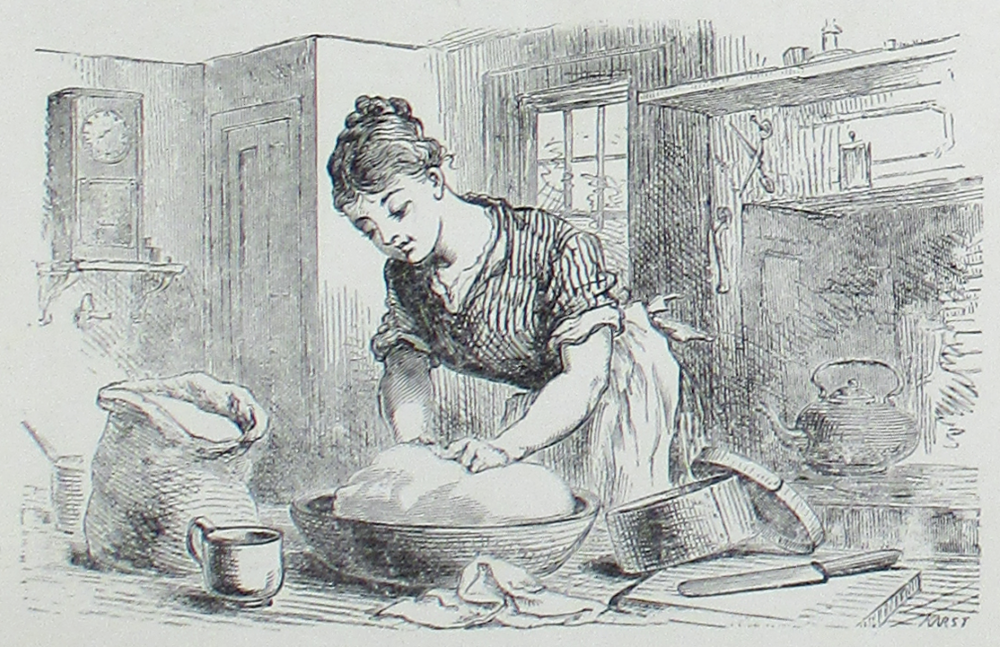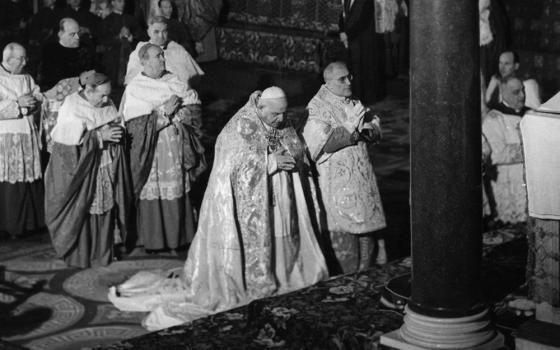
Drawing from "In My Nursery: A Book of Verse" by Laura E. Richards, 1890 (Wikimedia Commons/Public domain)
"The kingdom of heaven is like leaven, which a woman took and hid in three measures of flour, till it was all leavened" (Matthew 13:33). She spread it evenly by stretching and then folding the dough from the corners to the inside and kneading it skillfully. This parable often reminded me how a bit of leaven could make a large quantity of dough rise twofold in the kitchen.
It follows the parable of the mustard seed: "The kingdom of heaven is like a mustard seed, which a man took and planted in his field" (Matthew 13:31-32). The tiny seed grew into a tree till birds came and sat on its branches. Hence, I used to think that Jesus was underscoring the smallness of the leaven and mustard seed even as they have the potential to contribute tremendously to the realization of the kingdom of God. But, one day, it struck me in prayer that he is indicating something hidden in the words "three measures of flour," and I felt inspired to explore these parables deeper.
Three measures of flour would be sufficient to feed 100 people, as in a banquet. Jesus surely relates it to something familiar to his audience, enabling them to decode the hidden message (Matthew 13:34-35). I was disappointed to find that there is no consensus among scholars on the interpretation of biblical weights and measures. So, I started using my practical imagination to understand the words.
I doubt whether Jesus had ever cooked or had heard Mary, his mother, planning to bake such a large quantity of bread that he had to go out to borrow the big vessels, buy as well as carry home the flour, and pour water for her to knead it into several lumps of dough with both her hands. It is a task that requires much hard work and resilience and, of course, they did not have mixers and dough-kneading machines. Mary's knuckles and back must have been in much pain!
The parables seem to indicate a possibility for consecrated and lay women to receive the sacrament of holy orders.
Finally, lest we forget, would they not have needed a huge oven and a big fireplace to bake the loaves? How big is an oven shared by a small neighborhood community? Oh! The parable is allegoric, but why on earth does Jesus relate it with only one woman? Is he referring to the church? Or maybe showing how women are strong, too?
Considering the enormity of this endeavor, it seems unrealistic. Instead, Jesus might be relating the volume of flour used by the woman with that exclusively used by the priestly Levites for baking the covenantal shewbread, which is always present on the table in the Temple of Jerusalem (Leviticus 24:5-9).
This must have been general knowledge for his listeners, including any poor disciples who would have no capacity to prepare so much bread. The Temple authorities were known to hire expert bakers from the Levites (1 Chronicles 9:32) to supply the required quantity every week. The disciples must have been familiar with such bulk purchases happening in the market.
Frankly speaking, I think Jesus must have sounded somewhat insane and revolutionary to his listeners. Crafting such a parable, in which a woman is doing something exclusively reserved for male priests in the Holy of Holies of the Jerusalem Temple, would have seemed totally unwarranted. Jesus must therefore have been extremely serious about subverting tradition and equating women’s contributions with men's in the kin_dom ministry through the parables of the mustard seed and leaven.
The parables seem to indicate a possibility for consecrated and lay women to receive the sacrament of holy orders. The shewbread or presence-bread in the Old Testament reminds us of the Eucharistic bread and messianic banquet. Perhaps the Jewish-Christian community was breaking away from Judaism, and replicating and replacing Temple rituals with the Eucharist as the new covenant. However, commentators disagree whether these two breads are leavened or unleavened.
Advertisement
In my opinion, the parables of the mustard seed and the leaven are an antitype of the Old Testament. Surprisingly, although the man, Adam, was cursed to toil for his food (Genesis 3:17,19), he did not need to struggle for it in the parable of the mustard seed. It is very tiny and can take root simply by being scattered on the soil.
Similarly, although the woman, Eve, was told that she would be ruled over by the man (Genesis 3:16), the opposite is revealed in the parable of the leaven. Thus, Jesus upends ancient curses that exiled Adam and Eve from the garden of Eden (Genesis 3:23): The man sows effortlessly, unlike Adam's toil, and the woman rises as a leader, defying Eve's subjugation.
The raising of leavened dough also reminds me of the resurrection of Jesus, with Mary Magdalene as the first witness and apostle to the male apostles (Matthew 28:10), although women are not accepted as witnesses in the ancient world. Jesus' intention to reverse roles is confirmed!
Remarkably, after I had prepared the first draft of my research on role reversals in the parables of the mustard seed and the leaven, Pope Francis appointed women to take up roles traditionally reserved for high-profile clergy in the Roman curia. Sr. Simona Brambilla was appointed prefect of the Dicastery for the Institutes of Consecrated Life and Societies of Apostolic Life. She is the first woman to head a dicastery in the Vatican. Similarly, Sr. Raffaella Petrini has been appointed to head the Governorate of Vatican City State.
Isn't this the novelty of the kin_dom proclaimed by Jesus, which should be seen everywhere in the Catholic Church? I hope Pope Leo XIV will continue it.






